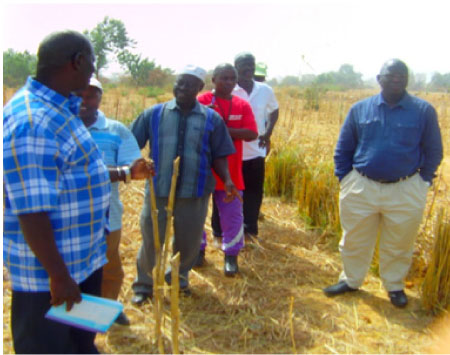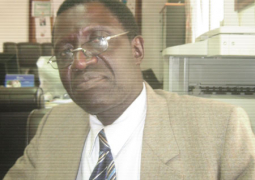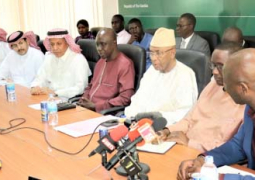
A fifteen man delegationled by Sait Drammeh, permanent secretary 11, from the Ministry of Agriculture and senior staff of Agriculture and Natural Resources (ANR), recently returned from Burkina Faso, after ten days study tour of project sites in some rural communities of Burkina Faso.
The trip was part of fulfilling the study tour requirement under the Participatory Integrated Watershed Management Project/SLMP Component (PIWAMP/SLMP) in The Gambia.
The delegates were drawn from PIWAMP project, the Department of Agriculture (DOA), the Ministry of Agriculture (MOA), the Central Project Coordination Unit (CPCU), the National Agricultural Research Institute (NARI), and the National Environmental Agency (NEA), and Finance.
The head of mission was the Permanent Secretary II of the Ministry of Agriculture (MOA), Mr Sait Drammeh, and the host and guide for the tour was Dr Patrice Djamen, officer in charge of the Regional ACT office.
According to PS Drammeh, the field visits were organised at many sites, aimed at having firsthand experience of some land management practices applied in
During these field visits, the participants visited several sites where SLM/SWC techniques are applied in the semi-arid zone of Burkina Faso and held meetings with staff of IFAD-sponsored Rural Development Project.
PS Drammeh further stated that the project sites visited in
One outstanding similarity, he noted, is that the project also carries out a watershed development approach to address land degradation problems.
In his presentation, the project coordinator mentioned that
Momodou L. Gassama, Project Coordinator of PIWAMP, stated that the Sustainable Land Management Project (SLMP) is an incremental financing for the Participatory Integrated Watershed Management Project (PIWAMP). He added that, PIWAMP as a project is designed to have nationwide coverage of the lowlands and uplands that are used for agricultural production in The Gambia. It seeks to address interlinked problems of rural poverty, food insecurity and land degradation.
He said: “Some of the expected outputs of the project include operational national and regional level Sustainable Land Management (SLM) Platforms comprising a multi-level partnership of stakeholder institutions promoting SLM; an agreed SLM Investment Framework for strategic planning, prioritization and implementation of targeted investments.”
The following, he added, will be achieved by implementing the SLMP: at least 10 senior policymakers and technical experts with an enhanced knowledge of different tillage techniques; a minimum of 36 ward level Multi-disciplinary Facilitation Teams (MDFTs) with the skills and experience required to support rural communities in implementation and monitoring of community-based watershed/landscape management plans; and at least 42 farmer-centred conservation agriculture validation trials and demonstrations will be achieved by implementing the SLMP.
Kebba Manka, SLM coordinator, further spoke on key important issues about land tenure and its best practices in The Gambia;
This will be followed by a national sensitization campaign on land tenure and land use before final adoption of the policy, he opined.
Other sites visited included the Conservation Agriculture (CA) based cropping systems tailored for sub-humid areas (800-1000mm rainfall/annum), and low cost, low energy, gravity Drip Irrigation techniques/systems for small holder farmers.




